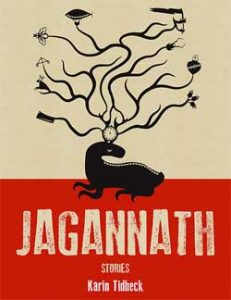Jagannath by Karin Tidbeck (book review).
Jagannath is a collection of thirteen short stories by Swedish author, Karin Tidbeck. The stories are written in English, but maintain a Nordic flavour. Not all the tales in this slim volume appealed. Though I found myself amused by the number of organic creatures populating the pages, I did get the sense I might have appreciated more of the stories if I had a more broad understanding of folklore. Jagannath has collected some outstanding reviews, however, and a couple of the stories easily illustrate why.

The last story, for which the anthology is named, is one of those odd adventures in literature where the reader constantly grasps for meaning. Rak is born into what appears to be the inside of a being known as Mother. Once she is grown enough, she is put to work massaging food through the intestines. Scraping sustenance from the interior walls and sleeping in a fleshy alcove, Rak expects to work there until she dies, at which point she will be massaged through those intestines by her replacement. Mother roams the world outside looking for food. Inside, the workers thrive and starve according to her diet. After a particularly lean period, Rak visits the nursery for a replacement worker and discovers there are no more babies. By the end of the story, I had little more idea who or what Mother was than Rak did, but I had plenty of theories—my favourite of which involved a post-apocalyptic scenario and alien centipedes. Either way, as Tidbeck’s story draws to a close, Rak’s begins again as she is birthed into the outside world. I found the imagery and imagination of ‘Jagannath’ extraordinary. I wanted to know more, but enough clues were provided for me to devise my own conclusions.
Another story that captured my attention was ‘Augusta Prima’. Augusta is a member of court in a world that exists out of time. Days are filled with activities that amuse the courtiers. Nights with revel. Servants are gruesomely treated and the bodies piling up across the pages were treated with less than idle curiosity until Augusta finds a trinket on one. She discovers it’s a watch and that it is used to measure time—a concept she is unfamiliar with. Once made aware of its passage, however, she finds she is unable to ignore it. She starts measuring her world and as a result, becomes bound by what she describes. A nice and simple allegory for the modern condition.
Many of the other stories lost me a couple of pages in as I either failed to find a speculative element or identify with the subject. Not so say the stories were badly written or boring, more not to my taste. I would like to mention one last tale, however. ‘Cloudberry Jam’ was simultaneously disturbing and sweet. As a mother, I felt the bittersweet pain at the end as the narrator of the story lets her baby go and that parting, mothers and children, seemed a theme throughout the collection.
While I did not understand or get ‘something’ from every story, reading Jagannath was still a worthwhile experience. I chose it on the strength of those outstanding reviews and, for me, the highlights outshone the low points.
Jagganath by Karin Tidbeck
Cheeky Frawg Books (June 27, 2012)
Paperback, 142 pages, £9.99, $10.53 (USD)
ISBN: 978-0985790400
http://www.cheekyfrawg.com/
